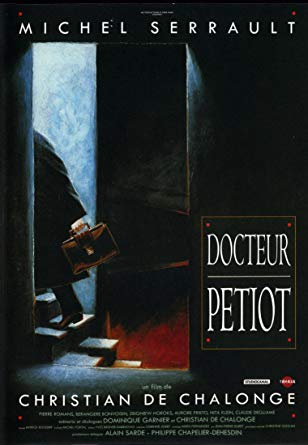 In a movie theater playing a silent horror film a man finds himself appalled by what he sees and enters into the movie being played, which leads into his real-life occupation of a doctor. The man is Marcel Petiot, a respected physician active in Nazi-occupied France—an “age of villains”—who knows a little something about real-life monsters. We learn that he’s working to help a Jewish couple escape to South America, although, as evinced by the sharpening knife sounds heard during Petiot’s chat with the couple, his true motives aren’t nearly as noble as they might seem. He also has a tendency to surreptitiously administer morphine to his patients, carries around severed heads in his doctor’s bag and bicycles around town vampire-like, wearing a fluttering shroud.
In a movie theater playing a silent horror film a man finds himself appalled by what he sees and enters into the movie being played, which leads into his real-life occupation of a doctor. The man is Marcel Petiot, a respected physician active in Nazi-occupied France—an “age of villains”—who knows a little something about real-life monsters. We learn that he’s working to help a Jewish couple escape to South America, although, as evinced by the sharpening knife sounds heard during Petiot’s chat with the couple, his true motives aren’t nearly as noble as they might seem. He also has a tendency to surreptitiously administer morphine to his patients, carries around severed heads in his doctor’s bag and bicycles around town vampire-like, wearing a fluttering shroud.
DOCTOR PETIOT (DOCTEUR PETIOT) is a 1990 French period piece. It starred the veteran actor Michel Serrault (1928-2007) and was made, brilliantly, by Christian de Chalonge, who takes into account the black comedy of Petiot’s situation as well as its more horrific aspects, while providing a fully convincing depiction of a very specific time and place.
Petiot, we learn, is quite tight with France’s Nazi occupiers. He’s quite pleased with their handling of the “Jewish problem,” as it allows him to indulge his psychosis on, and steal the valuables of, unsuspecting Jews—whose confidence Petiot cunningly gains before administering a deadly injection he claims is a vaccination, and then taking the victim to his or her final resting place in an incinerator in his cellar. Furthermore, Petiot is quite careful in his dealings with the outside world, having made preparations for what he might do should Germany lose the war.
What he hasn’t counted on is being caught, but that’s precisely what happens one day when his chimney becomes blocked and spews smoke everywhere. It being an age of villains, the Nazis assist Petiot in evading capture, a situation that remains in place after the 1944 liberation of France.
For those of you concerned about the ugliness of the content, be advised that the film is never particularly explicit in its depiction of Petiot’s demented handiwork (if it were really as graphic as it was alleged to be the film would probably have been more successful). A bigger concern, I feel, is the historical detail, which is laid on a bit thickly; anyone without a thorough knowledge of France in the 1940s will be at sea for much of the film, the final third, which Petiot spends largely off-screen, in particular (another likely reason DOCTOR PETIOT wasn’t as successful as it might have been).
Visually the film is impeccable, with spot-on, lived-in period detail amid locations that are often quite exotic: the rafters of a theater, a room filled with antique furniture and statues, the roof of a Parisian building, etc. The details of day-to-day life in early 1940s France, which include scenes of Nazis clowning around while Jewish people are rounded up and beaten, are superbly, and chillingly, evoked.
It’s driven by the performance of Michel Serrault, who perfectly renders Petiot’s charming bedside manner and also his psychotic edge. I’d go so far as to say that of Serrault’s 150-plus film credits DOCTOR PETIOT is one of the major stand-outs.
Vital Statistics
DOCTOR PETIOT (DOCTEUR PETIOT)
M.S. Productions/Sara Films/Cine 5
Director: Christian de Chalonge
Producer: Michel Serrault, Alain Sarde, Philippe Chapelier-Dehesdin
Screenplay: Dominique Garnier, Christian de Chalonge
Cinematography: Patrick Blossier
Editing: Anita Fernandez
Cast: Michel Serrault, Pierre Romans, Berangere Bonvoisin, Zbigniew Horoks, Aurore Prieto, Nita Klein, Claude Degliame, Martine Mongermont, Nini Crepon, Andre Julien, Andre Chaumeau
